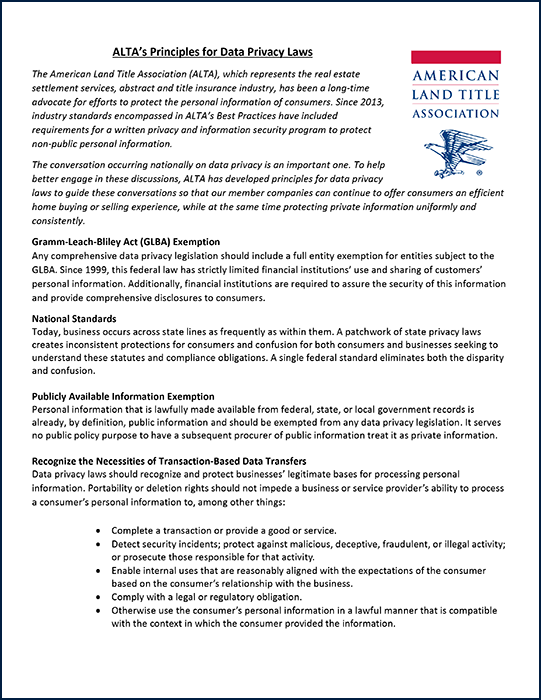 Background
Background
With states passing inconsistent laws and no uniform federal law addressing data privacy, there’s a patchwork of rules for companies to comply with. ALTA is dedicated to helping its members understand what they need to do to comply, if required, with data privacy laws.
ALTA Policy Position
ALTA believes any comprehensive data privacy legislation should include a full entity exemption for entities subject to the Gramm-Leach-Bliley Act (GLBA). Since 1999, this federal law has strictly limited financial institutions’ use and sharing of customers’ personal information. Additionally, financial institutions are required to assure the security of this information and provide comprehensive disclosures to consumers.
Data Privacy Principles
GLBA Protects Consumers' Privacy Rights
Resources
- ALTA-PRIA FAQs & Best Practices for Public Record Privacy Protections
- ALTA-PRIA Best Practices for Public Record Privacy Protections
- Basics of Privacy Rights
- Data Mapping
- Compliance Steps for US Privacy and Cyber Laws and Regs
- Suggested Privacy and Cyber Compliance Resources
- Data Privacy Implications for Service Provider & Third-Party Contracts
Webinars
Preparing for the California Consumer Privacy Act
- (Download PDF of presentation)
Compliance Webinar: Understanding Consumer Privacy Rights and Redaction Trends
- (Download PowerPoint Presentation)
Podcasts
ALTA Podcasts with Carlton Fields
Data Privacy Articles
Recent 2024 2023 2022 2021 2020 2019
You Must Make Data Privacy Part of Your Company's Cultural DNA. Here's Where to Start
Companies that fail to incorporate data privacy into their company culture face many potential security risks-- including an average of $9.23 million to recover from a single data breach. ALTA has developed data privacy principles, which recommend the development of a single, national standard to help protect consumer private information uniformly and consistently. ALTA also has complied suggested state legislative language regarding data privacy.
California-style Data Privacy Law Gets Bipartisan Support in Florida Legislature
Modeled after a California law that last year became the strongest data privacy law in the country, SB 1734 creates the Florida Privacy Protection Act and requires businesses to tell consumers what information they've collected and how they're going to use it. The bill requires any company that collects and sells consumer information to establish a button on its website to allow consumers to opt out of allowing the company to sell the information it has collected about them.
Virginia Passes Data Privacy Bill With ALTA-supported GLB Exemption
If signed by the governor, Virginia would be the second state to enact major privacy legislation, following the California Consumer Privacy Act.
ALTA Submits Letters to CFPB on Access to Consumer Financial Data
ALTA submitted two letters to the Consumer Financial Protection Bureau (CFPB) to aid in the development of regulations that affect consumer rights to access financial data. The bureau issued an Advanced Notice of Proposed Rulemaking last year to gather comments and information to assist in the development of regulations to implement Section 1033 of the Dodd-Frank Wall Street Reform and Consumer Protection Act. In one letter, ALTA outlined five principles the bureau should consider when evaluating access and use of data. In a second letter, ALTA along with eight other trade groups wrote evolving standards that protect consumers while promoting innovation.
Data Privacy Day: Raise Awareness
Data Privacy Day is today. Now is a good time to do something to protect yourself, your customers and your business. According to a Pew Research Center study, 79 percent of U.S. adults report being concerned about the way their data is being used by companies. The National Cyber Security Alliance says respecting consumers’ privacy is a smart strategy for inspiring trust and enhancing reputation and growth in your business.
How to Prepare for Consumer Data Privacy Laws
Comprehensive data privacy laws have become hot topics in state legislatures across the country, as well as in the halls of Congress. Laws like the California Consumer Privacy Act (CCPA), which establishes consumer rights related to personal information, are expected to be widely enacted across the country over the next few years. Read on for tips on how to start preparing and get your compliance ducks in a row.
FTC Warns Small Businesses of COVID Scam
According to the Federal Trade Commission, the email claims to come from the “Small Business Administration Office of Disaster Assistance,” indicating the recipient is eligible for a loan of up to $250,000 and asks for personal information like birth date and Social Security number.
